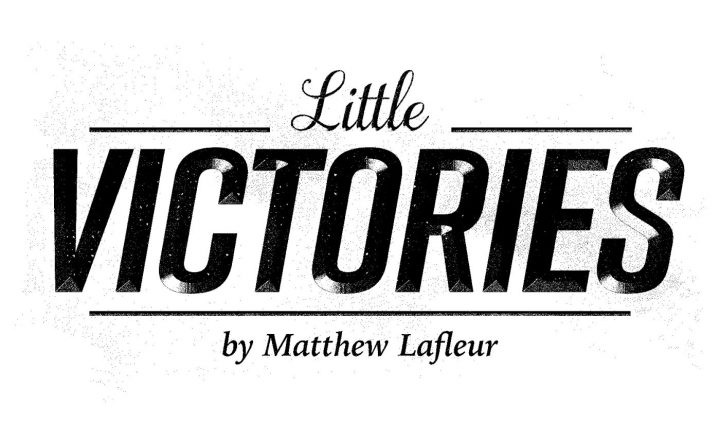The Zeego Tales: A Conflicting Gift
Written by |

I saw one of my middle school teachers the other day. Two decades have passed since I was in her religion class. She saw Zeego, my service dog, as he curiously sniffed around the occupational therapy clinic where my friend Will works.
“Ooooh! He’s beautiful!” she exclaimed. I explained how well-behaved and intelligent Zeego is and how great it is to have him.
“You are so lucky,” she said.
I cringe at that word. Can someone who requires a service dog be lucky? Asking that feels ungrateful.
I looked down at Zeego, golden specks shining on his white labrador coat. His glossy brown eyes stared into mine and I smiled. I am grateful beyond words to have him in my life.
I also dream of a day when I no longer require a service dog and when I will have to choose whether to keep my buddy Zeego or allow him to be of service to someone in greater need. I can feel gratitude and frustration at the same time. I can acknowledge the beauty of having Zeego, and also pine for a time when I don’t require a service dog.
Living in that contradiction is nothing new for people with a rare condition, such as Friedreich’s ataxia (FA). We can acknowledge the gifts we’ve received because of FA (in my case, an awesome job, a begrudging sense of persistence, and Zeego).
At the same time, FA is horrible. It has sapped my abilities and independence and — most unforgivably — has caused the deaths of many others around the world. I fight to see this genetic defect eradicated.
Can we sincerely appreciate the effects of something in our lives while at the same time want to get rid of it?
I think so. Television host and comedian Stephen Colbert once said in an interview, “It’s that I love the thing that I most wish had not happened.” He was speaking about the deaths of his father and two of his brothers in a plane crash when he was a child. He says that he’s learned to acknowledge, appreciate, and even love the changes to his character that were caused by that grief. But he still wishes that the event hadn’t happened.
It’s possible to feel conflicting emotions.
***
My junior high class was in session. The overhead fan creaked as its blades spun, and the exhausted window unit air conditioner bellowed. We had to raise our voices to be heard.
My classmates read aloud from our religion textbook: “There’s a time to weep, and a time to laugh; a time to mourn, and a time to dance ...” It was after lunch, and I struggled to keep my eyes open.
“So what it’s saying in Ecclesiastes, is that after you go through a period of suffering, you will be rewarded with a period of joy,” said our fiery teacher, pacing the classroom while trying to rouse her drowsy class. “Makes sense, right?” She slammed her hands down on a sleeping boy’s desk. He was startled but quickly nodded.
“Well, maybe it’s not that easy,” our teacher went on. “One time, I was late for a flight. I rushed to the airport, and when I arrived at my gate, I saw through the window that my plane was still there. I was relieved. But when I asked to be let on the plane, the lady at the desk said that the door was closed and there was nothing they could do. I was furious. I thought that if the plane was still there and I had a ticket, why wouldn’t they let me on?”
Our teacher stood at the front of the class and looked at us. “That plane crashed.”
She paused for dramatic effect. “Even though I am relieved and so thankful that I wasn’t on that flight,” she continued, “I still to this day get aggravated if I am late and they won’t let me on an airplane. So is it possible to feel both thankful and aggravated at the same time?”
The class was silent for a while. “I don’t think so,” said a sixth-grade know-it-all (probably me). “I think you felt annoyed, then suddenly switched and felt thankful. I think those are two separate times. I don’t think you can feel both at once.”
She sighed. “Maybe you’ll understand when you’re older.”
***
I struggled on an exercise table, high-fiving Will while trying to stay balanced. I kept falling to the side, saying, “I’m sorry.”
“Stop apologizing,” he ordered.
“I know I shouldn’t,” I said. “It’s just frustrating. This should be easy.”
My downcast eyes locked on Zeego’s looking up at me in droopy admiration.
“Love you, buddy,” I whispered to him.
I think I understand now.
***
Friedreich’s Ataxia News is strictly a news and information website about the disease. It does not provide medical advice, diagnosis, or treatment. This content is not intended to be a substitute for professional medical advice, diagnosis, or treatment. Always seek the advice of your physician or another qualified health provider with any questions you may have regarding a medical condition. Never disregard professional medical advice or delay in seeking it because of something you have read on this website.



Kelly Barendt
Best article, yet!
Matt Lafleur
Awesome compliment! Thanks for reading
Barbie
This is a great and relatable article!
Matt Lafleur
Thanks so much for reading in the comment!